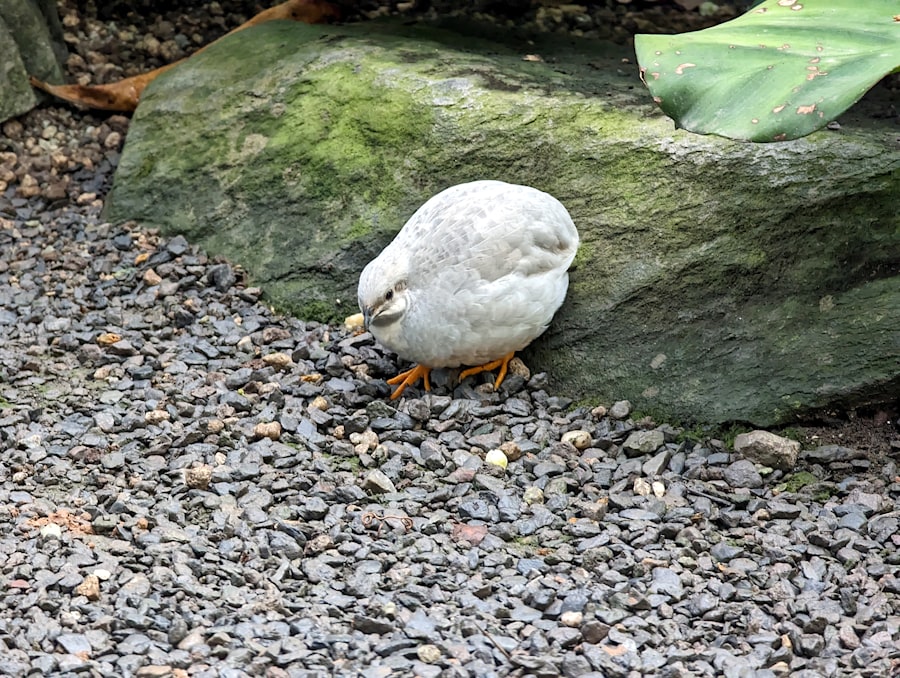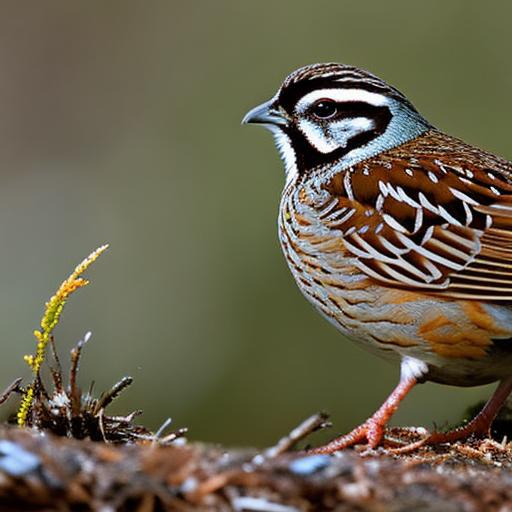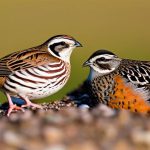Quail keeping has become increasingly popular in recent years, as these small birds are relatively easy to care for and can provide a sustainable source of eggs and meat. Quail are also known for their gentle nature and can be a great addition to a backyard farm or homestead. There are several different species of quail that are commonly kept, including the Coturnix quail, Bobwhite quail, and California quail. Each species has its own unique characteristics and requirements, so it’s important to do your research before getting started with quail keeping.
Quail are known for their ability to thrive in a variety of environments, making them a versatile option for many different types of homesteads. They are also relatively low maintenance compared to other poultry, making them a great option for beginners or those with limited space. Quail can be kept in small enclosures and don’t require as much space as chickens or other larger birds. Additionally, quail eggs are considered a delicacy in many cultures and can be a valuable addition to a small farm’s product offerings. Overall, quail keeping can be a rewarding and enjoyable experience for those looking to add a unique and productive animal to their homestead.
Key Takeaways
- Quail are small, low-maintenance birds that are easy to keep and can be a great addition to a backyard farm or homestead.
- Quail require minimal space, with about 1 square foot per bird recommended for housing, and access to a secure outdoor area for foraging and exercise.
- A balanced diet of commercial quail feed, supplemented with fresh greens and occasional treats, is essential for the health and productivity of quail.
- Regular monitoring for signs of illness, good hygiene practices, and access to clean water are key components of maintaining the health of quail flocks.
- Breeding quail for egg production can be a rewarding endeavor, with proper management of lighting, nesting areas, and egg collection contributing to successful outcomes.
Housing and space requirements for quail
When it comes to housing and space requirements for quail, there are a few key factors to consider. Quail are relatively small birds, so they don’t require as much space as larger poultry like chickens or ducks. However, they still need enough room to move around comfortably and engage in natural behaviors like dust bathing and foraging. A good rule of thumb is to provide at least 1 square foot of space per bird in the enclosure. This will ensure that the quail have enough room to move around and will help prevent overcrowding and aggression within the flock.
In terms of housing, quail can be kept in a variety of different types of enclosures. Many quail keepers opt for simple wire cages or hutches, which provide good ventilation and make it easy to clean up droppings. It’s important to provide a secure enclosure that will protect the quail from predators like raccoons, foxes, and birds of prey. Additionally, quail need protection from the elements, so their housing should provide shelter from wind, rain, and extreme temperatures. Overall, providing a safe and comfortable living environment is essential for the health and well-being of your quail flock.
Feeding and nutrition for quail
Feeding and nutrition are crucial aspects of quail keeping, as a well-balanced diet is essential for the health and productivity of the birds. Quail are omnivores and have specific dietary requirements that need to be met in order for them to thrive. A good quality commercial quail feed is a great option for providing the essential nutrients that quail need. Look for a feed that is specifically formulated for quail and contains a balanced mix of protein, vitamins, and minerals.
In addition to commercial feed, quail can also benefit from supplemental treats and foraging opportunities. Fresh greens, fruits, and vegetables can be offered to provide variety in their diet and keep them engaged. It’s important to avoid feeding quail any toxic plants or foods that are harmful to them, so do your research before offering any new treats. Additionally, providing access to grit is important for quail, as it helps them digest their food properly. Overall, ensuring that your quail have access to a well-balanced diet will help keep them healthy and productive.
Health and disease management for quail
Maintaining the health of your quail flock is essential for successful quail keeping. Like all animals, quail are susceptible to a variety of diseases and health issues that can impact their well-being. It’s important to be proactive about disease management and take steps to prevent illness within the flock. This includes providing a clean living environment, practicing good biosecurity measures, and monitoring the health of your birds regularly.
Common health issues in quail include respiratory infections, parasites, and nutritional deficiencies. It’s important to familiarize yourself with the signs of illness in quail so that you can take action quickly if any issues arise. Working with a veterinarian who has experience with poultry can be helpful in developing a health management plan for your quail flock. Additionally, practicing good hygiene and sanitation in the coop and surrounding areas can help prevent the spread of disease. By staying proactive about health management, you can help ensure that your quail stay healthy and productive.
Breeding and egg production in quail
Breeding and egg production are important aspects of quail keeping for those who are interested in raising quail for eggs or meat. Quail are prolific layers and can start laying eggs as early as 6-8 weeks old, making them a valuable source of fresh eggs for your homestead. In order to maximize egg production, it’s important to provide your quail with a well-balanced diet, plenty of light, and comfortable nesting boxes.
When it comes to breeding quail, it’s important to provide the right conditions for successful mating and egg fertilization. This includes maintaining a proper male-to-female ratio in the flock, providing adequate nesting space, and ensuring that the birds have access to a comfortable and stress-free environment. Quail eggs typically take around 17-18 days to hatch, so it’s important to provide proper incubation conditions if you plan on hatching your own chicks. Overall, breeding and egg production can be a rewarding aspect of quail keeping, providing you with a sustainable source of eggs for your homestead.
Common challenges and problems in keeping quail

While quail keeping can be a rewarding experience, there are also some common challenges and problems that quail keepers may encounter. One challenge is predator protection, as quail are vulnerable to attacks from predators like raccoons, foxes, and birds of prey. It’s important to provide secure housing and take steps to deter predators from the area in order to protect your flock.
Another challenge is maintaining proper temperature and humidity levels, especially when it comes to hatching eggs or raising chicks. Quail chicks are delicate and require specific conditions in order to thrive, so it’s important to provide the right environment for them to grow and develop.
Additionally, aggression within the flock can be an issue, especially if the birds are overcrowded or not provided with enough space. It’s important to monitor the behavior of your quail and take steps to prevent aggression within the flock.
Overall, being aware of these common challenges and taking proactive measures to address them can help ensure a successful experience with quail keeping.
Conclusion and tips for successful quail keeping
In conclusion, keeping quail can be a rewarding experience for those looking to add a unique and productive animal to their homestead. By providing proper housing, nutrition, health management, and breeding conditions, you can help ensure that your quail stay healthy and productive. It’s important to be proactive about addressing common challenges like predator protection, temperature control, and aggression within the flock in order to maintain a successful quail keeping experience.
Some tips for successful quail keeping include providing adequate space for the birds to move around comfortably, offering a well-balanced diet with access to supplemental treats, practicing good hygiene and sanitation in the coop, monitoring the health of your birds regularly, and providing proper conditions for breeding and egg production.
Overall, with proper care and attention to their needs, quail can be a valuable addition to your homestead, providing you with fresh eggs and potentially meat for your family’s consumption. Whether you’re new to poultry keeping or looking to diversify your homestead’s offerings, consider adding quail to your flock for an enjoyable and rewarding experience.
If you’re considering keeping quail, you may also be interested in learning about different coop options for poultry. Check out this informative article on garden chicken coops to find out how to create a suitable and attractive living space for your feathered friends. Whether you’re looking for a farmhouse-style coop or considering the option to rent a chicken coop, this article provides valuable insights into creating a comfortable and secure environment for your birds.
FAQs
What are some basic facts about keeping quail?
Quail are small ground-dwelling birds that are relatively easy to keep and care for. They require a secure and predator-proof enclosure, a balanced diet, and access to clean water. Quail are social birds and should be kept in groups to prevent stress and loneliness.
What type of housing do quail require?
Quail require a secure and predator-proof enclosure that provides them with enough space to move around and exhibit natural behaviors. The enclosure should also have a sheltered area for protection from the elements and potential predators.
What do quail eat and drink?
Quail require a balanced diet that includes a commercial game bird feed, supplemented with fresh greens, fruits, and insects. They also need access to clean water at all times, as they can quickly become dehydrated.
What are some common health issues for quail?
Common health issues for quail include respiratory infections, parasites, and injuries from predators or other birds. It’s important to monitor the health of quail regularly and seek veterinary care if any issues arise.
Are quail noisy or smelly?
Quail are relatively quiet birds, especially compared to other poultry species like chickens. They do not produce a strong odor if their enclosure is kept clean and well-maintained. However, it’s important to regularly clean their enclosure to prevent any unpleasant odors.
Meet Walter, the feathered-friend fanatic of Florida! Nestled in the sunshine state, Walter struts through life with his feathered companions, clucking his way to happiness. With a coop that’s fancier than a five-star hotel, he’s the Don Juan of the chicken world. When he’s not teaching his hens to do the cha-cha, you’ll find him in a heated debate with his prized rooster, Sir Clucks-a-Lot. Walter’s poultry passion is no yolk; he’s the sunny-side-up guy you never knew you needed in your flock of friends!







